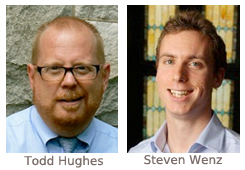Social Pedagogies: Language Teaching with Google Earth and Wikis
by Andrew Greer, 2013 Teaching Certificate Recipient and 2012-13 SoTL Scholar
Many of us have memories of foreign language classes with seemingly never-ending repetitions of semi-useful phrases. I remember learning German for years, only to be surprised by my lack of fluency when I traveled to Austria. The repetition of banal phrases in my German classes didn’t prepare me for the on-the-spot communication required in everyday interactions with native speakers. I became fluent only after spontaneous practice. Thankfully, language classes can use technology to help students practice in much more useful ways than in my day.
As a part of the Celebration of Teaching event hosted by the Center for Teaching, Todd Hughes and Steven Wentz presented exciting advances in foreign language education on a panel titled “Innovative Uses of Web 2.0 Technologies in Foreign Language Teaching.” The two panelists from the Center for Second Language Studies introduced audience members to two forms of technology they used in the classroom: Google Earth and wikis. They use these tools to facilitate learning in the classroom, and even better, their use of this technology is bolstered by theory.
Hughes and Wentz use a framework of social pedagogies from Randy Bass and Heidi Elmendorf to justify the uses of technology in the classroom (for more information, read their white paper ). The framework includes a series of questions about the intended uses of technology in the classroom:
- What are the articulated learning outcomes?
- What do they look like?
- Are students informed of the outcomes?
- Are the outcomes tangible?
- If students create an artifact, who is the intended audience?
- What media do students use to create the artifact?
These questions emphasized the point that technology should not be incorporated in classroom activities just because it’s something different or new. Further, Hughes and Wentz discussed linking relationships between learning processes, adaptive processes, learning environments, and intellectual communities. They encouraged us to examine how these relationships connect to larger contexts for knowledge and action. The overarching goal of their framework is to transfer knowledge to a larger community. Hughes and Wentz argued that this is what foreign language education should do. So how does knowledge transfer look in their examples of Google Earth and wikis?
Wentz presented audience members with multiple ways to improve foreign language education with Google Earth (GE) that aligned with the framework of social pedagogies. First, he discussed the advantages of GE compared to conventional paper maps. Wentz discussed the constant updates to GE and the multiple layers that can be added with a mouse click. With GE, students in foreign language courses could discuss the current weather in cities or zoom in further to give directions to a classmate. Students can also view photos, videos, and virtual paths with spoken directions that others have uploaded. Additionally, the utilities are interdisciplinary, extending to the social sciences, humanities, and more. The interactive applications of GE not only increase the amount of spontaneous conversation compared to traditional methods of repetition, but also the information can be shared with other teachers and learners who wish to use GE in their classrooms. When done well, foreign language instruction with GE aligns with the social pedagogies framework.
Hughes discussed wikis, a different technology that foreign-language educators can use for any level of language ability. He introduced wikis as a student-created collaborative writing tool with the purpose of sharing information with classmates. Hughes presented two case studies of wikis in basic and more advanced courses. Students at basic levels of fluency used the wiki to improve reading and writing skills, as well as to prepare for roundtable discussions of four social themes (e.g., religion in France). More advanced students used their wiki to investigate sophisticated literary themes (e.g., art across novels about different time periods). Instructors could make the wikis as public or private as they wished. The links to the framework of social pedagogies became clear when Hughes (and audience members) discussed the strong degree to which students excel when their wiki project is available to one another as opposed to traditional, private term papers.
Google Earth and wikis offer exciting advances in foreign language (and interdisciplinary) education. The technology can align with a framework of social pedagogies, and its use isn’t merely to make the classroom more futuristic or “neat.” If my teachers had used (or even had access to) these technologies, it’s likely that my German skills would have been much better. Instead of embarrassing lags while I struggled to think spontaneously, I could have practiced this skill in the classroom. Hopefully, the next generation of language learners will benefit from these constantly advancing and interactive technologies.

Leave a Response